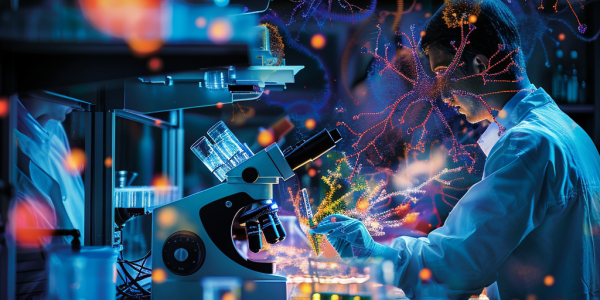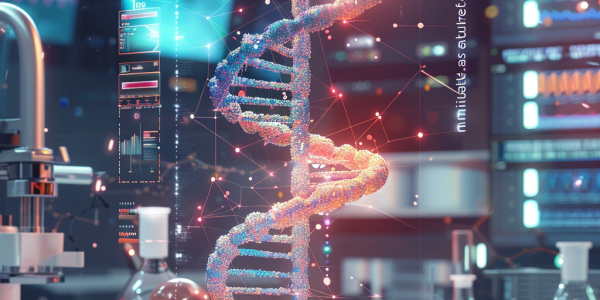Groundbreaking Research Unveils Secrets of Red Milkweed Beetle’s Toxic Diet Adaptation
Recent research led by Rich Adams reveals groundbreaking insights into the red milkweed beetle, Tetraopes tetrophthalmus, and its unique adaptation to toxic milkweed plants. By sequencing the beetle’s genome, scientists uncover how it thrives on a lethal food source, showcasing the intricate co-evolution between insects and plants. This study enhances our understanding of biodiversity and may impact agriculture and pest management.
UNC Researchers Uncover New Role of 2’3′-cGAMP in Cancer Metastasis
The UNC School of Medicine’s groundbreaking study reveals a new role for the molecule 2’3’-cGAMP in cell migration and cancer metastasis, highlighting its interaction with Rab18. This research opens pathways for innovative cancer treatments and enhances understanding of immune responses and tumor progression.
Study Links High-Potency Cannabis to Epigenetic Changes in DNA
A recent study from King’s College London published in Molecular Psychiatry reveals that high-potency cannabis, particularly with THC levels of 10% or more, induces significant epigenetic changes in DNA. This research highlights the potential mental health implications of cannabis use, especially in individuals experiencing their first episode of psychosis. The findings suggest a unique DNA signature linked to high-potency cannabis, paving the way for future studies on its genetic impact and potential risk assessment for psychosis.
Dr. Bruce Lahn Named to 2024 PharmaVoice 100 for Leadership in Biotechnology
Dr. Bruce Lahn, Chief Scientist at VectorBuilder, has been named to the prestigious 2024 PharmaVoice 100 list, recognizing his significant contributions to genetic engineering and biotechnology. Under his leadership, VectorBuilder is advancing gene delivery solutions, crucial for personalized medicine and innovative therapies. This accolade highlights the importance of visionary leaders in the pharmaceutical industry, shaping the future of healthcare and improving patient outcomes.
Groundbreaking Research Reveals ‘Third State’ of Cells After Death
Scientists have discovered a ‘third state’ of cells that allows them to exhibit new functionalities even after death, challenging traditional biological concepts. This groundbreaking research, led by biologists Peter Nobel and Alex Pozhitkov, reveals the adaptability of cells known as xenobots and anthrobots, which can reorganize and thrive post-mortem. Their findings, published in the journal Physiology, suggest that cellular systems possess a remarkable plasticity, opening new avenues for regenerative medicine and our understanding of life and death.
Ancient Fossil Discovery Sheds Light on Evolution of Complex Life
A groundbreaking discovery in Australia has unveiled the ancient creature Quaestio simpsonorum, providing crucial evidence of bilateral symmetry and the evolutionary journey of complex life over 500 million years ago. This rare fossil find from the Ediacaran period highlights the significance of paleontology in understanding Earth’s history and the ecological dynamics of early life forms.
New Study Reveals Insights into Mitochondrial DNA Inheritance and Potential of Vitamin K2 in Treatment
A groundbreaking study from the University of Colorado Boulder reveals new insights into mitochondrial DNA inheritance, emphasizing the critical role of maternal transmission and the elimination of paternal mitochondria. This research sheds light on the mechanisms behind mitochondrial disorders and suggests that Vitamin K2 may offer therapeutic potential for those affected. Discover how these findings could transform our understanding of cellular energy production and mitochondrial health.
AI and Genetic Engineering: Pioneering the Future of Bespoke Proteins for Environmental Solutions
Recent advancements in artificial intelligence and genetic engineering are revolutionizing biotechnology, enabling the creation of bespoke proteins that could tackle environmental challenges like climate change and plastic waste. With AI’s ability to predict protein structures and gene editing technologies like CRISPR, researchers can design proteins for targeted applications in agriculture and medicine, paving the way for innovative solutions. However, ethical considerations surrounding these technologies remain crucial as we explore their vast potential.
Scientists Discover Method to Pause Human Development, Transforming IVF Potential
Recent advancements in biological research reveal a groundbreaking method to pause human development, with significant implications for reproductive health and in vitro fertilization (IVF). A study published in Cell explores how manipulating the mTOR signaling pathway allows human stem cells to enter a state similar to diapause, potentially improving embryo implantation timing and success rates in IVF treatments. This innovative discovery opens new avenues for addressing fertility challenges and enhances our understanding of biological adaptability.
Breakthrough Study Reveals Key Role of CK1δ in Regulating Circadian Rhythms
Recent research from Duke-NUS Medical School and UC Santa Cruz reveals how Casein Kinase 1 delta (CK1δ) regulates circadian rhythms, impacting sleep and biological functions. Published in PNAS, the study identifies key mechanisms of CK1δ, including its isoforms δ1 and δ2, and their role in controlling our internal clock. These findings could lead to new therapies for sleep disorders and other health issues linked to circadian rhythm disruptions.










